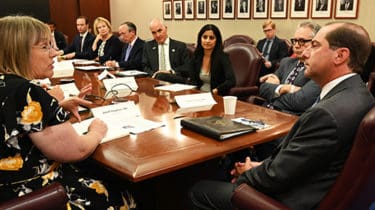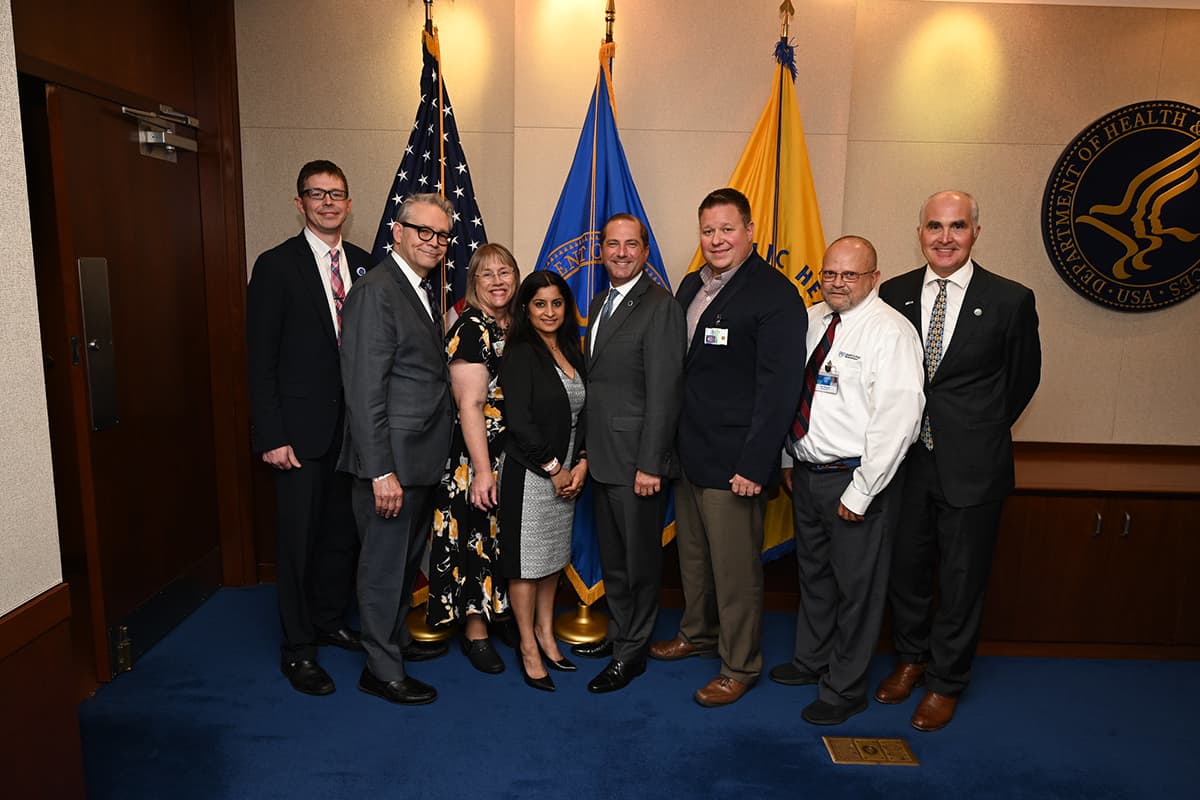Digital Health Obstetrics Program Earns Attention of Cabinet Secretary, States
| Aug. 8, 2019 | The UAMS Institute for Digital Health & Innovation Obstetrics Program has gotten the attention of U.S. Secretary of Health and Human Services Alex Azar and of several states interested in duplicating them or using them to improve rural health care.
In early July, Curtis Lowery, M.D., director of the Institute for Digital Health & Innovation, traveled to Washington, D.C., to make a presentation to Azar, along with three other experts on aspects of rural health care from other states. Lowery also is a maternal-fetal medicine specialist.
“I got called in for maternal mortality because it’s become such a problem,” Lowery said. “It’s on the rise, and we’re the worst industrialized nation in the world for maternal mortality. The institute’s Digital Health Obstetrics Program has been touted as a solution for equalizing care delivery across geographic regions. They had read about it and brought me in.”
Founded in 2003 at UAMS, the Digital Health Obstetrics Program is an innovative consultative service for a wide range of physicians including family practitioners, obstetricians, neonatologists and pediatricians in Arkansas.

Azar, right, and Lowery, second from right, listen to a presentation during the Roundtable with Rural Health Innovators.
Maternal-fetal medicine specialists using a broadband connection through the institute’s network can see ultrasound images live and talk to pregnant mothers at dozens of health care providers statewide. Experienced registered nurses staff the institute’s Call Center around the clock every day. They provide counseling, telephone triage of immediate health concerns, and education concerning health problems during pregnancy.
Beyond these services, the program is engaged in the early stages of a pilot study at a rural Arkansas hospital to see how effective the live video support of maternal-fetal medicine specialist can be in helping to resuscitate a delivering mother when she has a problem, whether it’s a hemorrhage, a high blood pressure crisis or something else.
It’s similar to and supportive of the institute’s Perinatal Outcomes Workgroup through Education and Research (POWER) program, which sends instructors to Arkansas rural hospitals to train them in patient care protocols that can protect the life of the mother and her baby.
“Some of the smaller places don’t have the people trained to be able to do this with the protocols, and they don’t have the resources to implement the protocols. That’s problematic,” Lowery said. “The idea is to use digital health to do that, plus just building the infrastructure through a contract with Medicaid to fund the people to go out and do the training and be on call.”
Lowery said Azar and the administrators in the Department of Health and Human Services were very interested in how to implement the institute’s programs to reduce maternal mortality and especially how to fund it.
“Secretary Azar listened attentively and asked good questions about whether it could be copied and if we had results as to its benefits,” Lowery said. “He was very impressed, and I believe he thought it was a good idea.”
Three other states — Hawaii, Iowa and Louisiana —have expressed interest in duplicating the Digital Health Obstetrics Program. Lowery said Hawaii goes to considerable expense to fly mothers with high-risk pregnancies to specialists when in most cases a digital health consultation could provide the care and expertise they need.
Lowery said the talks are in the early stages, but the states might set up systems like the one the Digital Health Obstetrics Program uses here in Arkansas, along with its call center and around-the-clock support.
A large system in New York with more births in its network than the entire state of Arkansas also is talking with Lowery and the institute about using the institute’s call center to support a referral and live video consultation in New York.
“People are finding out about the program, and they want to copy it,” Lowery said. “We’re helping them do that.”
